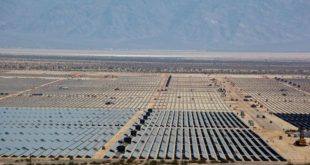California Leads the Way for Advanced Transportation Vehicles
California celebrates National Hydrogen and Fuel Cell Day today on the cusp of a transportation revolution that will lead to cleaner air and fewer greenhouse gas emissions as more drivers turn to zero-emission vehicles.
The U.S. Senate has declared Thursday, Oct. 8, 2015, National Hydrogen and Fuel Cell Day, referencing hydrogen’s standard atomic weight of 1.008 and in recognition that hydrogen is an abundant source of fuel, as well as cleaner and more efficient than petroleum.
California is a leader in developing and deploying hydrogen fuel cells for passenger vehicles, industrial vehicles and backup power for cell phone towers.
“California has long supported hydrogen and fuel cells as a vital zero-emission technology,” California Air Resources Board (ARB) Chair Mary D. Nichols said. “Transit customers in the Bay Area and Coachella Valley have enjoyed clean, quiet and powerful hydrogen fuel cell electric buses for years. California companies operate more efficiently by using hydrogen fuel cell electric forklifts in warehouses. Marking the first National Hydrogen and Fuel Cell Day in 2015 is particularly appropriate as auto companies begin selling consumer fuel cell electric vehicles to Californians.”
The California Energy Commission has provided funding for 49 retail hydrogen refueling stations anticipated to open over the next two years.
“Hydrogen fuel cell electric vehicles are an important part of the portfolio of technologies and fuels the State is pursuing to address our ambitious climate and air quality goals,” said Janea A. Scott, the lead commissioner for transportation at the Energy Commission. “Through an Energy Commission program, the State is investing in an initial network of up to 100 hydrogen stations to provide the needed fueling infrastructure to support fuel-cell electric vehicles.”
California’s investments in alternative fuel vehicles, like hydrogen fuel cell electric cars, are fueling the state’s economy and leading to cleaner air.
“Hydrogen and fuel cells are poised to play a significant role in California’s economic growth well into the future,” said Panorea Avdis, chief deputy director of the Governor’s Office of Business and Economic Development (GOBiz). “Together, hydrogen and fuel cells demonstrate that improving our environment is good for business.”
GOBiz provides vital assistance in the hydrogen fueling station permit process and helps station developers locate and expand in California.
The California Department of Food and Agriculture’s Division of Measurement Standards (CDFA DMS) evaluates and tests new hydrogen dispensers for suitability and accuracy, enabling retail stations to sell fuel to customers. CDFA DMS is also the agency responsible for providing fuel quality sampling and laboratory analysis, which ensures the best possible vehicle performance.
“Instituting early marketplace oversight of hydrogen sold at retail will be a key component to successful consumer acceptance of this fuel,” said Kristin Macey, director of CDFA DMS.
The ARB partners with transit agencies to advance the adoption of hydrogen fuel cell electric buses. AC Transit operates 12 fuel cell electric buses in the San Francisco East Bay Area, and SunLine Transit operates four fuel cell electric buses in the Coachella Valley. Fuel cell electric buses are poised to enter the commercial market in California with larger pilot projects that may compete for funding under the ARB’s Low Carbon Transportation Program.
The ARB and the Energy Commission are founding members of the California Fuel Cell Partnership, a public-private collaboration committed to promoting fuel cell electric vehicle commercialization. The State also participates in H2USA, a public-private partnership to promote the commercial introduction and widespread adoption of hydrogen fuel cell electric vehicles across America. California participates in H2FIRST, an initiative of U.S. Department of Energy’s Fuel Cell Technologies Office within the Office of Energy Efficiency and Renewable Energy, Sandia National Laboratory and the National Renewable Energy Laboratory, to support customer-friendly fueling stations and advance hydrogen fueling technology for a commercial market.
 Alternative Energy HQ solar power for homes, wind energy, and bio fuel issues
Alternative Energy HQ solar power for homes, wind energy, and bio fuel issues








